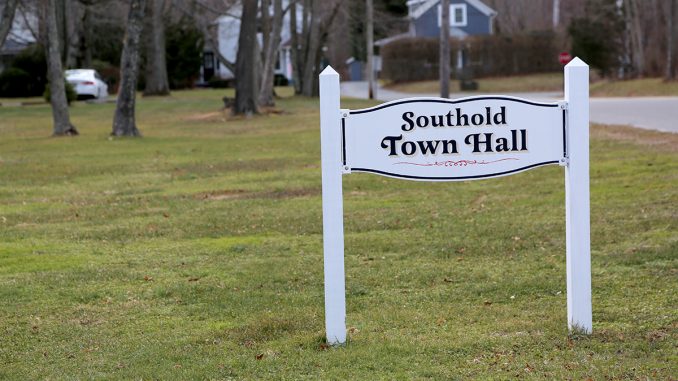
Southold Town may hold off on a referendum to add a half-percent transfer tax for housing solutions, as a June deadline to add the proposition to the November ballot approaches.
The Peconic Bay Region Community Housing Act, signed into law in October, allows the five East End towns to hold referendums on adding 0.5% to the 2% community preservation fund tax on real estate transactions in those municipalities. Each town needs to present a plan for the funds before holding a referendum.
“I’ll take responsibility for it, but there’s a deadline we weren’t going to meet this year because of the unique circumstance with the primaries. We didn’t have until August to get it onto the ballot, we had until June. So we can’t get it done in time. I don’t think we can,” Supervisor Scott Russell said at a joint meeting with the Town Board and Village of Greenport Trustees on Tuesday.
He told a reporter after the meeting that usually referendums can be placed on a ballot until around September, but this year the town was informed their deadline was at the end of June, coinciding with June 28 primaries.
“That narrows our ability to get it on the ballot, because now we’re operating under the premise that originally, we had until September and everything was timed around that deadline but now we’re told that it’s the end of June and we can’t simply get our work done by then,” he said. “We do have the attorney looking into it but by all accounts we would have needed to have everything done by June in order to get it on this November’s ballot. That just doesn’t look feasible.”
Even if the deadline was still September, it would have still been very difficult to meet, Mr. Russell added. The tax could be added to the ballot anyway, without a complete plan, but the Town Board felt it would be better to wait so people know what they’re voting on. If the plan is not put up for vote this November, the town plans to add it to the ballot next year.
“We felt it very important to have a plan and give the community time to review that plan before they have the option to vote on it,” Town Board member Jill Doherty said at the work session.
“The public has a lot of financial concerns, which is understandable given the current uncertainty of the economic climate and you always have to worry about that when you’re asking the public to approve a new tax,” Mr. Russell said in an interview.
The town has accepted a proposal from Nelson Pope Voorhis, the only company to submit a bid. The consulting agency said in its proposal to Southold, submitted May 5, that the aim is to complete the plan in four to five months.
NPV plans to hold two public meetings in-person and two on Zoom as they work with the Town Board, Housing Advisory Commission and other municipal department representatives. The consulting agency notes the town may need an advisory board for the housing fund with representation from various stakeholders.
Some of the challenges the town faces include water supply constraints, lack of wastewater treatment infrastructure and cost pressures from second home and seasonal rental markets, according to NPV.
The housing plan, which “will provide a menu of options” for fund use, may include suggestions such as offering financial assistance to first-time homebuyers from the town, or producing or rehabilitating community housing to sell or rent.
Both Southampton and East Hampton have released draft plans ahead of the ballot, as reported by local outlets. Gerry Siller, supervisor of Shelter Island, said a public hearing was held on a draft plan last Friday and the town is on track to vote on the proposition this November.
Village trustee Julia Robins emphasized at the joint meeting that the town and village should team up on affordable housing solutions.
“There is nothing for rent in the Village of Greenport right now year-round. Zero. I am personally involved with a family that is about to be homeless at the end of the month, they’ve been in the same house for 14 years, being sold,” she said. “This is absolutely a critical thing. We need to get together and talk about it. We should have a joint commission.”
Town Board member Louisa Evans said the plan shouldn’t entirely depend on new development to solve the local housing crisis.
“That’s what’s so exciting about this new transfer tax. We’d be looking at around $3 million of revenue to be targeted to solving the affordable housing crisis without adding additional density,” added Town Board member Greg Doroski.
Village trustees pointed out that the housing crisis is linked to the labor shortage in the town. The village Business Improvement District is “extremely concerned about worker retention” and “can’t get people to work here,” said Ms. Robins, who pointed out that the housing crisis is a nationwide issue.
“We’re talking about a workforce here that will not be here for the town and that eventually will have an impact on everything in this town, including the value of our homes,” she said. “These people cannot afford and do not have a place to live here … If we don’t have a workforce here in this town, if we don’t have people living here, then it’s going to have a destructive value.”

Be the first to comment